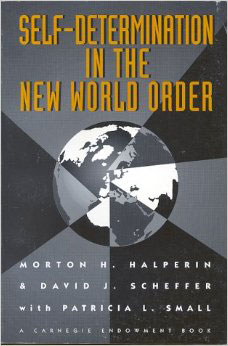Source: Washington
 In the aftermath of the breakup of the Soviet empire, new nations are emerging rapidly, and more and more ethnic groups are pushing for independence or autonomy. But there has been relatively little public debate about how the United States should respond. To encourage such debate, Halperin and Scheffer examine the dynamic self-determination movements that are erupting across the globe and analyze U.S. policy toward them. In particular, the authors take a look at what international law says about intervention by the United States or other nations to support or oppose such movements. They also consider under what conditions such moves might be wise. They propose criteria for decision makers who are weighing whether to support groups seeking self-determination, to offer political recognition, or to intervene with force.
In the aftermath of the breakup of the Soviet empire, new nations are emerging rapidly, and more and more ethnic groups are pushing for independence or autonomy. But there has been relatively little public debate about how the United States should respond. To encourage such debate, Halperin and Scheffer examine the dynamic self-determination movements that are erupting across the globe and analyze U.S. policy toward them. In particular, the authors take a look at what international law says about intervention by the United States or other nations to support or oppose such movements. They also consider under what conditions such moves might be wise. They propose criteria for decision makers who are weighing whether to support groups seeking self-determination, to offer political recognition, or to intervene with force.
Advance Praise
“…[T]he book succeeds in challenging traditional thinking and the West's conservative attitudes towards self-determination.”
—Kamal S. Shehadi, International Institute for Strategic Studies
“Clear, insightful analysis underpins the new ideas in this volume, some of which are already entering international discussions but are nowhere brought together so well.”
—Andrew J. Pierre, Foreign Affairs





